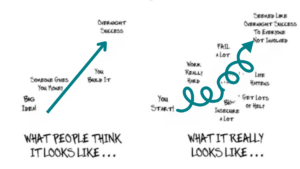In psychology, there are principles of developmental stages you go through from birth to death.
Infancy, childhood, adolescents… you get the picture.
There are stages in business too.
The principle of developmental stages in business refers to the distinct phases of growth, development, and evolution over time.
Let’s call them Start Up, Spotfire and Scale.
- Startup is any business that is beginning or redefining a new target market, creating a new product or service.
- Spotfire is any business that is wanting to grow but is still in the in the messy stage.
- Scale is any business that you’re taking action to grow and serve more.
These stages represent different milestones, challenges, and opportunities that a business encounters as it progresses from its inception to maturity.
MG is three years old, so it’s transitioned through the initial phase where the business is just starting. This time had high levels of uncertainty. I didn’t know if it would work, so I kept experimenting and changing the name, the business class evolving, and trying to figure out the formula.
This stage has been accompanied by asking these questions;
- What are we doing?
- Who are we serving?
- Do I really want to be doing this?
Surely you’ve said the same thing over time too?
But having trialled and tested, done the mindset work to evolve to have more certainty, we are certain of the niche, the product, the service and the problems we are trying to solve.
Then there is Spotfire, AKA the growth stage.
Growth doesn’t happen at a nice start upward trajectory.
It looks a little more like this.

In this stage, the business experiences rapid expansion, increased market share, and putting out fires.
You often find yourself in situations where you need to quickly solve unexpected challenges and overcome obstacles that arise in your business.
The complexity of business has grown. It is no longer a solo business, it is multiple products and services, more people, more staff. And with that comes more problems and challenges.
If you are in this stage, it can feel like “putting out fires,” where you are addressing urgent issues to ensure the smooth operation and growth of your venture.
And this is where “no man is an island.”
And building a team is your best path to doing what you love.
Once the major fires are put out, and you have your team, then there is scale.
Scaling a business focuses on putting out fires to strategically expand to meet a goal. In MG, we’re focused on streamlining operations, optimizing efficiency, and leveraging technology and automation to increase productivity.
We have also deep-dived into the scalability of our product or service and want to make it more user-friendly for people.
This has meant lots of hidden work to create, build, content, and streamline the business.
Scale is juggling between meeting current market demand and preparing for future growth.
Now, I realise not everyone’s goal is to scale. And a bigger business doesn’t mean a better business.
What I want you to question is, what is the path of growth for me and my business?
If we stay in start-up mode for a decade, have we really pushed ourselves and grown personally or professionally?
Is it an inspiring goal to step out of being a solopreneur and into being a business owner (AKA have a product, service and staff (even if it is one assistant?)
By recognizing developmental stages in business, you can appreciate the opportunities ahead and adapt your mindset to match the new stage you want to grow into.
The stages also show the importance of continuous learning, self-growth and leadership required to thrive in a dynamic business environment.
With love and a sprinkle of growth,
Tanya x
Leadership Coach & Master Certified Demartini Method Facilitator
BAppSoSc (Counselling)


